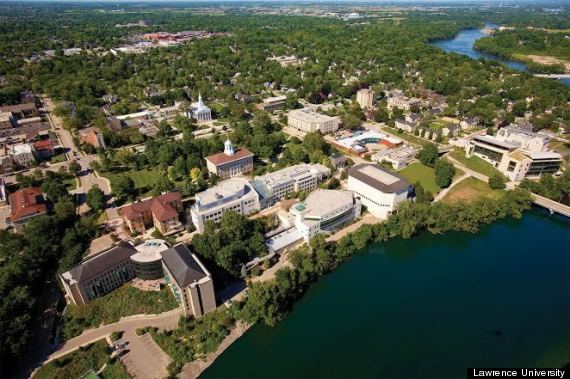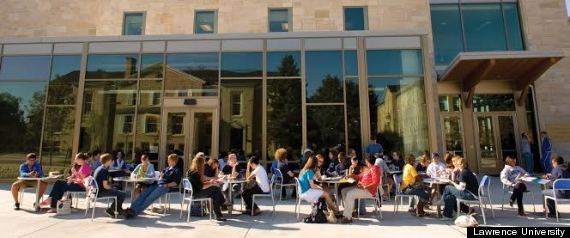
About 70 years ago, Nathan Pusey, the president of Lawrence University, noticed that other colleges across the country were introducing courses exploring great works of literature with an eye toward starting a big conversation -- a conversation that would get to the heart of life's big questions and engage students not only through all the years of their education but after graduation. That is, for the rest of their lives. He decided to create his own program and make it a cornerstone of the Lawrence education. The two-trimester class he invented in 1945 and named Freshman Studies combines the studies of science, music, art and literature, encouraging every incoming student to actively participate in a discussion about what constitutes a good and meaningful life.
Located in Appleton, Wisconsin, Lawrence University is a private, liberal arts college with just over 1,500 undergraduate students. And it continues the Freshman Studies tradition in an era where the value of an education rooted in the humanities is consistently questioned and scrutinized. Against this cultural backdrop, Lawrence maintains that a classic liberal arts education can serve as a defining point in every undergraduate's college, and life, experience.

Lawrence University
The name "Freshman Studies" may sound generic, but the curriculum is filled with an ever-changing and multidisciplinary list of books, films and musical works that encourage students to explore the bigger questions in life in a deep and meaningful fashion.
What is the good life? What does it mean to have an identity, and how does one find it? What is our place in the world as human beings, and how do we relate to our natural environment? How are we as individuals affected by society?
While many of these questions sound like the standard set presented in a Philosophy 101 course, Lawrence takes them out of large lecture halls filled with hundreds of students and raises them in sections of no more than 15 freshmen. The professor serves as a facilitator rather than a lecturer -- no lesson plans, no specific goals for each meeting, no test preparation. Instead of traditionally teaching the work -- its history, meaning and significance -- the professor opens the floor entirely, so students can talk freely about whatever they find most compelling.
Lawrence's instructors even challenge students to question the program itself, by asking things like, "Have you got a mind of your own, or do you believe everything thrown at you in Freshman Studies?" They also have the students question the course's overall value with sentiments like, "Is listening to a Mozart opera or reading a Faulkner novel just another way to kill some time while you wait to do something really worth doing?"

A small Lawrence University class discussing outside on the Main Hall green
Biology professor Elizabeth De Stasio has experienced the Freshman Studies program from multiple perspectives. As a freshman at Lawrence in 1979, De Stasio read As I Lay Dying by William Faulkner, which left her feeling utterly confused but nonetheless enthused about figuring out what it meant.
"I was just excited to get to college, and this just seemed like college," De Stasio told The Huffington Post. "We were looking at works I had never seen in high school, we were talking in ways we had never talked before, the faculty member served more as a facilitator of the discussion, and we were really being asked to think in different ways -- not just summarize, repeat what was in front of us, but actually think deeply about what these things mean in and of themselves and what they mean to us personally as individuals. It was very cool, very exciting and very different."
De Stasio has taught Freshman Studies several times since 1992 and also directed the program for two years. She explained that the program structure keeps the faculty in mind just as much as the students by keeping them more broadly educated in fields outside their specialty. Each Lawrence professor is required to teach Freshman Studies, and approximately 60 members of the 120-person faculty lead a section of the course at any given time. From science and music to literature and art, they explore topics outside their own disciplines, reminding them that truth can be expressed in many different ways.

A small Lawrence University class discussion
Considered the defining course in a Lawrence education, Freshman Studies takes ego and hierarchy out of the classroom and levels the playing field for both the professor and the students. From Plato's The Republic (the only work to be included in each course curriculum since 1945) to Mary Shelley's Frankenstein to Jorge Luis Borges' Collected Fictions, the class inspires each group to think critically about how each of the works speak to one another, how they are similar, how they are different and what that implies for the overall human experience.
"It stimulates intellectual curiosity because you're not just being spoon-fed information," said De Stasio. "It's really, 'Here are what a lot of great thinkers have thought in the past (and some of them currently). What do you think about those thoughts? How do those thoughts comport with the thoughts that are presented in another book that was written 200 or 2,000 years ago? What's changed? What hasn't changed?'"

Lawrence University students
Almost 70 years since its introduction, the course remains a requirement -- and an experience to look forward to -- for all Lawrence freshmen and faculty. The campus-wide conversations of these big questions have made the university a truly collaborative place, according to De Stasio, binding the students and professors through their years at the school, and beyond. She has watched students' faces light up at the chance to discuss what constitutes as the good life, as well as when they begin exploring how we know things, how we know whether we actually know things, and how we know that this is, in fact, reality.
"They are at a very transitional time in their lives when it is time for them to stand on their own two feet and think, 'What do I believe?'" said De Stasio. "'Not what are my parents telling me I should believe, my religious community, my grandparents, my culture, my friends -- What do I think?' And putting these options in front of them of what other people have thought and then asking what they think of that is a good strategy."
To check out the reading list for this year's Freshman Studies class, click here.

